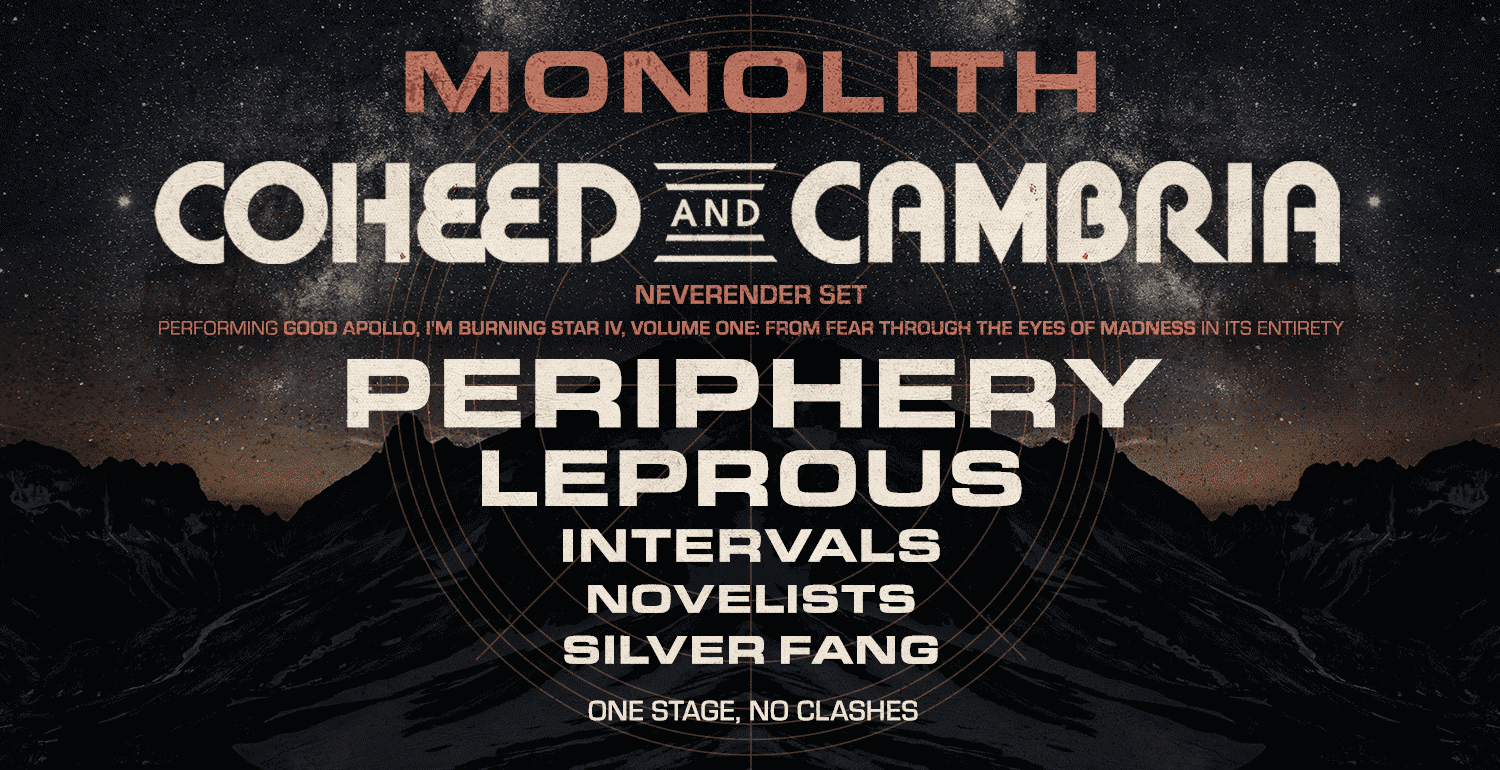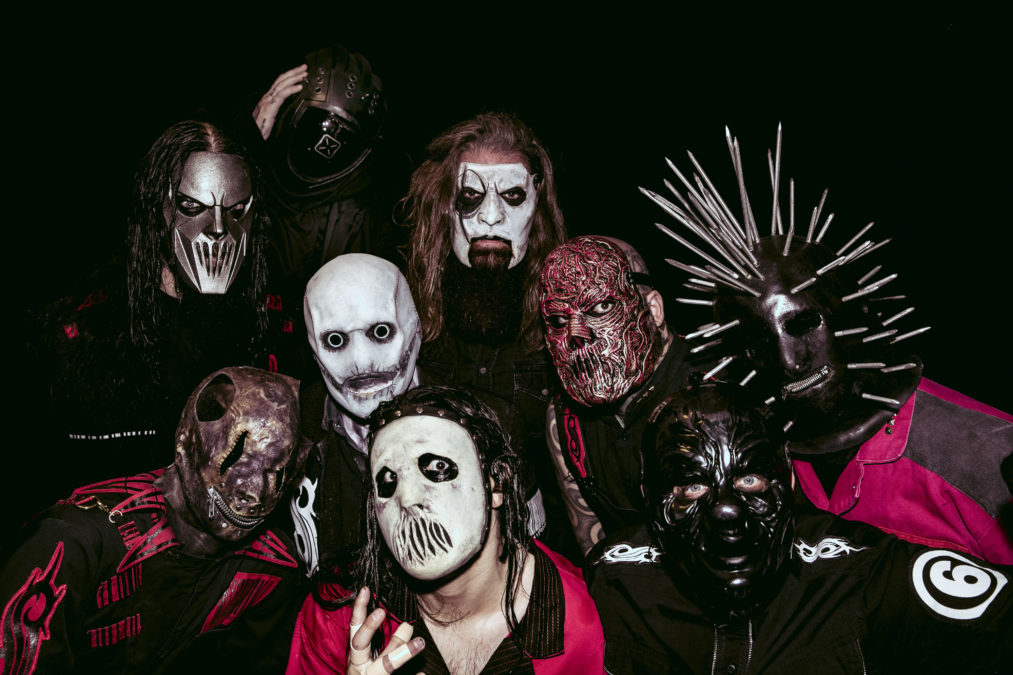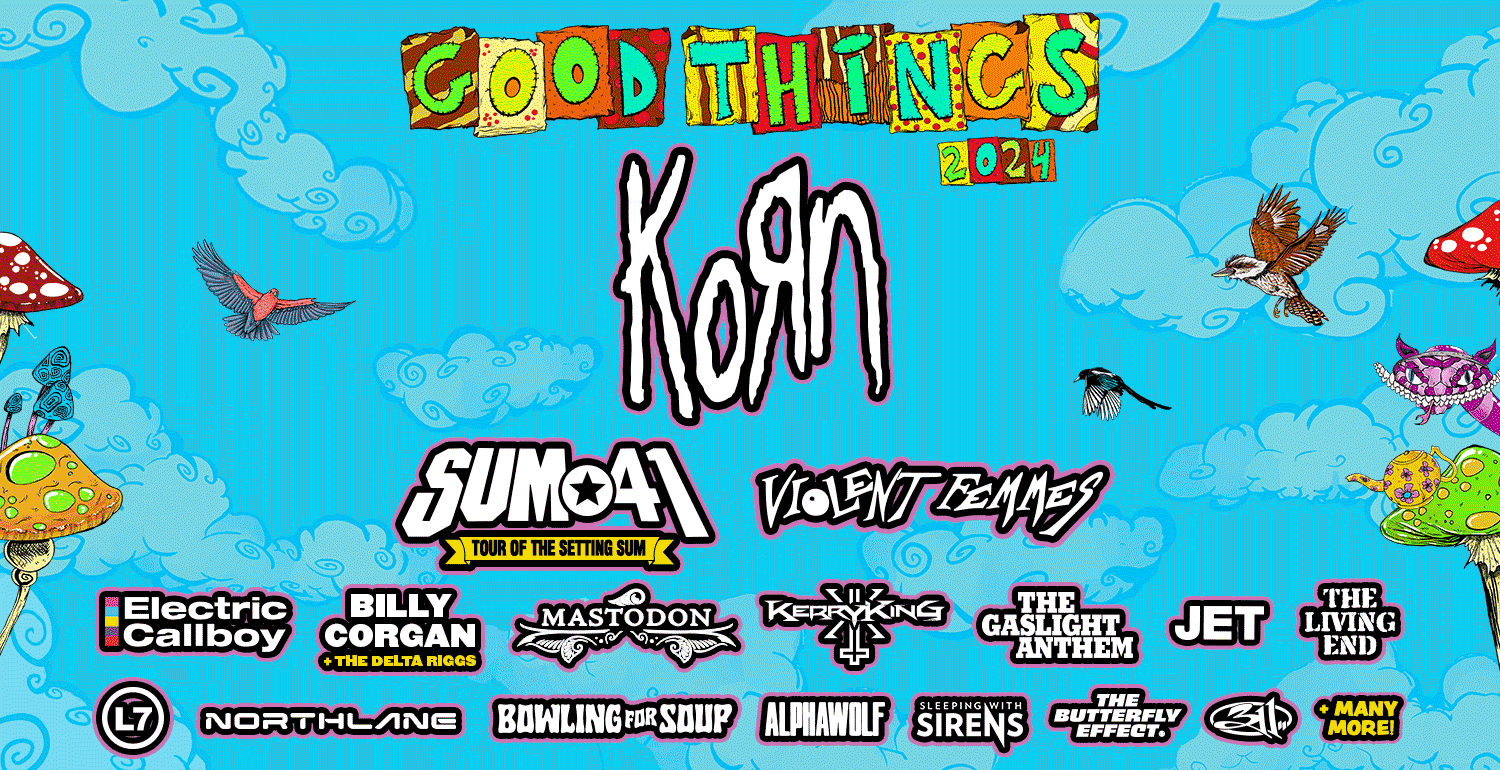By now Slipknot need no introduction.
For that matter, Slipknot have needed no introduction from the moment their self-titled debut album forced its way violently into this world, announcing the arrival of a new breed of music that would revolutionalise the sonic landscape like never before.
Iowa, Vol 3 (The Subliminal Verses) and All Hope Is Gone followed, ushering the name Slipknot onto the lips of a new generation of music lovers that found acceptance in metal where other parts of their lives failed.
Combining physical aggression with an impenetrable wall of musical mayhem, Slipknot became a global phenomena, transcending the lines between mainstream acceptance and heavy metal despite their refusal to conform.
Disaster struck for the nine musicians who were friends first and foremost when bass player Paul Gray died in a hotel room in his hometown of Iowa in 2010, sparking fears Slipknot would be unwilling and/or unable to continue following the loss of their brother.
After a prolonged break of uncertainty, Slipknot returned in 2014 with the album .5 The Gray Chapter in direct tribute to Gray’s memory and legacy.
We Are Not Your Kind in 2019 saw the band explore more musical possibilities, bringing in elements that were previously given life more so through vocalist Cory Taylor‘s side project Stone Sour.
Despite initial unrest from old-school fans, We Are Not Your Kind became recognised as one of the finest albums Slipknot has produced, with many claiming it to be yet another step in the evolution of heavy music.
Tragedy continued for the band when former drummer Joey Jordison passed away in 2021, and despite the fact he had left Slipknot eight years earlier, his death left an even greater chasm in the spirit of his former bandmates and friends.
In true Slipknot fashion the band began to focus on what would become their seventh album The End, So Far, with the vague title an obvious acknowledgement that everything has an expiry date with the timing being the only uncertain factor.
Bass player Alessandro Venturella (VMan) joined HEAVY to chat about The End, So Far, in the process offering a rare insight into the inner workings of Slipknot.
We started by asking how the band were feeling about an album which has already garnered so much interest.
“Super stoked,” VMan enthused. “Super pumped and looking forward to having a physical copy in my hands. It’s nice to see it coming towards the end. There’s a lot of… so many ups and downs to get everything to fall into place, but it’s nice knowing it’s almost there.”
Much of Slipknot’s charm lies in the spontaneous and anarchic nature of their music. Nothing feels pre-meditated or contrived and, more importantly, nothing seems forced.
Which makes sense when VMan explains that The End, So Far was not an album that was designed to fit a schedule or expectations.
“There was never really a set goal of where we wanted it to go,” he measured. “We started off when we got back from tour in Europe and then the COVID thing obviously happened, and everyone is in different places around the world, so it’s not a thing where we can just pop down the road and hang out in a studio and start writing. So, a lot of stuff was done like I did stuff here and Jim was writing over there, until it kind of got together with Clown. I had been sending him stuff, and we put everything on the table to see where we were and the more we worked on it the more we realised this is where it’s gonna go. This is gonna be the album. After a good bit of demoing and putting it together, I felt like we were coming to a point where it felt like this is the next step for Slipknot and now hearing it once it’s all done and finished that’s definitely what we’ve achieved. It’s a progression from We Are Not Your Kind into a new era.”
Such is the eclectic nature of Slipknot’s music in general that choosing songs to release off each album must be a logistical nightmare.
The whole idea of releasing singles is to drip feed the new music and arouse anticipation in the patiently waiting public. But when pretty much every song on the album follows its own trajectory, choosing individual songs to represent the collective can become painstaking.
“Adderall and Finale are front and back of the album,” VMan began, “and the way that those are brought in and then the scattering of the heaviness, I feel like that’s where we’re going. The journey of what those songs are going to do is just out of nowhere you’re hit with something. It’s tough because at the beginning the songs that we started on were the heaviest ones first and then the way that the other ones were brought into life was… that’s what I was saying before, when we were finally piecing our work together that’s when we knew what we had. I feel like the album in itself is a piece of music. I think start to finish is how it was meant to be, and I’m glad that’s the way it came out.”
Much has already been made of the album title and whether it has any significance or meaning as to the future of Slipknot.
Even though we already know the answer, HEAVY decides to press VMan anyway with the truth of any significance.
“You’ve got The End, and then you’ve got So Far,” he said, stating the obvious in a not-so-obvious way. “It doesn’t mean that it’s the end. If you cover up the end bit and just look at the so far…”
It doesn’t help either when you listen to an explanation from Clown’s own mouth that says cryptically “new music, new art and new beginnings.”
“It’s what he does. He’s Clown,” VMan smirked. “You can’t give anything away, otherwise what are you left with?”
Rather than go straight on the front foot as expected with The End, So Far, the album instead opens with the hypnotically beautiful Adderall, throwing immediate doubt as to the direction the following eleven tracks will take.
“The way that they structured it…,” Vman thought before answering. “I was never involved in the piecing together of songs, but Adderall‘s a different song anyway. It evolved into what you have now. Drums were added, guitars were added, bass was added, and it evolved into something else. We didn’t really see it as a connection. It was never a thought of saying this needs to sound like that or this needs to be close and then that will be the statement. I think it was literally by chance. Once we finished each individual song and Cory would put together the structure of the album, that’s the natural way I think that anyone would put it together. I’m glad it happened that way because the way I had them in order of songs is completely different to how it is now (laughs). I think the first interview I did someone was telling me about it and I thought that’s not the order, and then I realised oh shit (laughs). That’s how I got given it on dropbox.”
Clown not only acts as judge, jury and executioner for the Iowan natives, but he also shows a natural flair for the creative and dramatic by filming Slipknot’s music videos.
He has a flair that would best be described as Rob Zombie meets Humphrey Bogart with a deft touch that brings out emotion and sincerity with a visual accompaniment that fleshes out each film clip to extremes.
If you only knew the maniacal, keg bashing Clown from Slipknot’s live shows, you would likely find it difficult to believe or appreciate the meticulous and often brilliant nature of his role as director.
“Clowns just Clown,” Vman shrugged. “He’s there to do the best that he can. He’s got such a great vision. I love watching him work and where he’s going with things. I try my best to not look into what we’re about to do because I like to be surprised by things. I remember getting the run sheet saying what it’s about, and I thought you know what, I’m not gonna look at it (laughs). I’m just gonna get there and someone is gonna tell me what to do and it was great to walk into something and not be oh, that’s that thing that he mentioned or that’s there. I just walked in and took it in and could see where he was going. We finished shooting one day while we were doing Yen and some guys went home but me and Jim stuck around, and we were sitting on the deck chairs by the pool area, and we were watching it all happening, and just seeing Clown work and the way that he talks to people and the crew was inspiring to see. If you’re on stage, you see him doing his thing, but to see him do that thing that he does is great to watch. There’s no bossing around. He’s very aware of everybody and what everyone needs.”
The End, So Far is Slipknot’s seventh album, with each release pushing the acceptable parameters of music in directions previously believed impossible. While VMan touched on this earlier on in the chat, we press him again to find out how much of what ends up committed to disk is planned prior to the recording process.
“Nothing was discussed,” he affirmed. “No one really said this is how we need to move on. With the demoing I would do here for the songs on the record, I just wanted to do heavier stuff. I’m not gonna write a classical piece or something like that. I write heavy metal, and I’m in a heavy metal band (laughs), but it was when we got to Clown’s and started to dissect stuff or add stuff that’s when the theme or the idea of where going came in. Yen in itself is a heavy song, but it’s also super melodic, so it was never a thought where we said right, we need to do this, this is how it has to go down. It just came. Finale was a song that was completely different, got switched backwards, something got pulled out of there and that then became the chorus and then the intro. Mike started adding his piano, no one said this is how it has to happen. It happened and it kept growing and growing. Then, when you add someone like Joe Berusi into the mix, he turns it into something even bigger because that’s what he does.”
VMan joined Slipknot at a difficult time following the death of Gray. Not only was he the first member to be drafted outside of the original nine, he was also dealing with a band who were unsure if they even wanted to continue making music, let alone step back out into the public domain.
“It’s funny,” he began. “We were in a time when obviously the COVID thing happened and stuff like that, and when we do take a break, we take a break. We were previously two years off between the Gray Chapter and We Are Not Your Kind, and then you come back together, and it’s as if there was no two years off. As you progress with the band and I progressed with the band there’s more understanding of the way everybody works and the way that their input goes into making Slipknot, Slipknot and I think now we’re at that point where it’s natural. When it’s time for someone to do something, it’s time to do something, and it’s nice to be part of that now and to have someone to ask what’s your input on it. So, feeling like you’re part of the unit, that’s something that has been a natural progression as well.”
Despite the overwhelming support of VMan coming into the band, the circumstances surrounding the promotion were difficult to absorb.
“It was a weird one,” he agreed. “It was an amazing experience. It wasn’t some hazing thing (laughs) or it wasn’t (puts on mocking voice) you have to be like that. There was none of that It was a difficult time. I walked in and I needed to do a job and that was the job I had to do. Once again, the progression was Jim saying look, he’s a bass player so why don’t we get him to do the bass. That’s when I started recording the songs. There were a few songs where Jim tracked the bass because it was easier for time management, but I did a good chunk of the album – ten songs or something – and then being around we did an open studio where we would work on songs and I would be like how about we try that? And that would work and that’s how it was. Then we went on tour for ages, and it progressed. From being a tech for so long and going into that where I wasn’t on a schedule any more like 9 to 5 or 9 to 12 in the morning loading out a truck to then sitting around the studio all day and being able to play an instrument… t was such an amazing experience (laughs).”
Perhaps more to do with respect for their fallen brother than publicity, the brains trust of Slipknot delayed announcing the actual identity of their new bass player for an extended period of time. It was a secret maggots all over the world desperately tried to unravel in finding out the identity of the mysterious new bass player.
Then the inevitable happened and someone in the land of music recognised an identifiable hand tattoo in the film clip for The Devil In I and VMan’s cover was blown.
“There was no trouble,” he laughed. “It was a funny one because I remember saying should I put some black tattoo gloves on? And they said no one’s gonna get it (laughs). I was like, okay. I’ve worked with quite a few high profile bands and if it’s not gonna be called out by a fan it’s gonna be called out by someone in a tech position, or someone from another band going…’that’s VMan isn’t it?’ (laughs). ‘That’s VMan’s tattoo’. Once you see that… There was also a good grace period of six months where I just disappeared off the face of the planet. I was getting messages, but I couldn’t tell anyone what I was doing. I would just say um, I’m just away (laughs). I think it got pieced together pretty quick.”
VMan’s first live appearance with Slipknot came on probably one of the biggest stages of all when he made his debut appearance at Knotfest 2014. Although he still remembers that moment vividly, he also stresses he was more focused on getting things right musically than taking the spectacle in.
“I was more nervous about everything sounding right and me being able to play,” he smiled. “The crowd aspect didn’t sink in until everyone started playing and I was just concentrating then all of a sudden I looked up and though oh shit (laughs), that is actually a lot of people. From there it was just a gradual progression. It was Jay’s first ever show. It was a weird experience. There was a lot going on. If it wasn’t the pyro going crazy or the lights or something like that you’ve got a mask on, then you’ve got in-ears on, and you’re just running around like AHHHH, but as a musician I can’t just play wrong notes and throw my bass around. For me, I have always been about holding it down and trying to keep it as tight as possible.”
One new component VMan brought to the Slipknot experience was the introduction of his flame throwing bass. While it has become a crowd favourite of the live set, VMan reveals that the original idea was more born out of curiosity than a plan to introduce something new to the live show.
“We were just going in to rehearsals and I remember texting Clown and saying can I have a flame thrower please” he laughed, “just pissing around. And he said sure, why not. He said let me see if it looks shit or not and our pyro company bolted it onto a body I had and then we tested it and I sent it through, and he just said cool (laughs). And that was it, that easy. Can I have a flame thrower please? Sure.”
Slipknot were supposed to be part of a monster double bill touring Australia in 2019 with Metallica just before COVID ripped live music from our lives. It is a tour that was already mostly sold out and one which fans are desperate to see repeated.
“Um… it’s… I’m just gonna say sooner than later we will be on that side of the world,” VMan smiled coyly. “It’s my favourite place to go and play, so I’m looking forward to – hopefully – we can get some sort of run. With Slipknot, it’s not just nine dudes and a couple of guitars. It’s 40 to 50 year old crew, you know what I mean? It’s big. And a lot of trucks. Also, everyone’s touring at the moment so it’s hard to pinpoint when you’re gonna play or what’s gonna happen because it keeps changing. I’m not gonna say yes (laughs). You’ll have to wait and see. Trust me, I really wanted to do that Metallica show, but people’s health comes first.”













